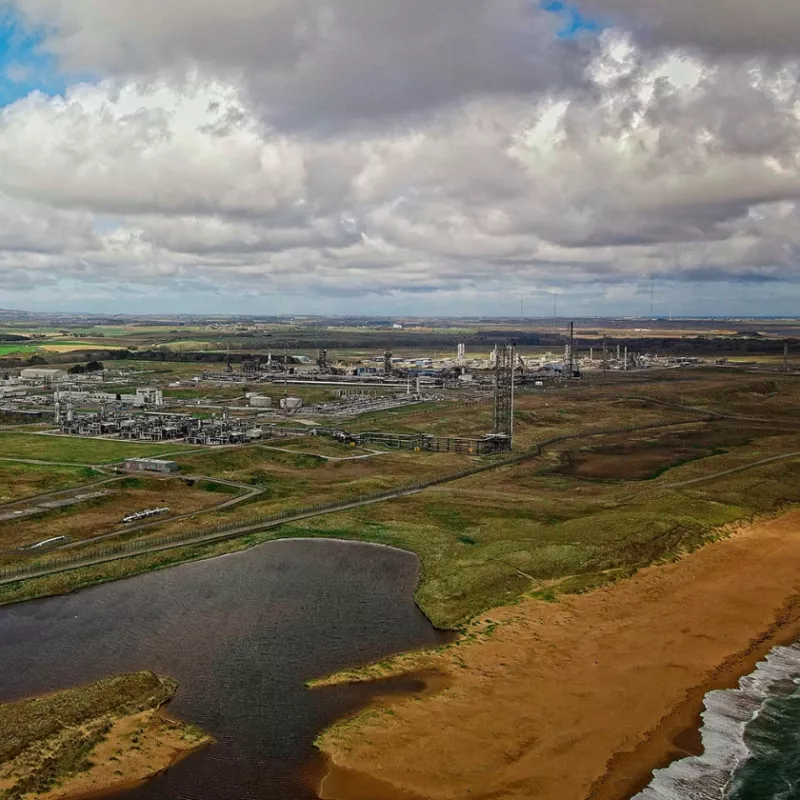Comment by Professor Stuart Haszeldine, SCCS Director
Today’s announcement from the UK Government that the Scottish Cluster and the Viking cluster in the Humber have both been selected as the next two clusters to be built by 2030 really is excellent news. These two clusters can now go on to play critically important roles in decarbonising the UK economy, facilitating a just transition from oil and gas and in meeting our net zero target and other climate ambitions.
The UK Government now needs to provide clarity on the process and timeline on the Track-2 capture projects that will feed into Acorn and Viking, as well as those feeding into the previously announced Track-1 clusters (East Coast Cluster and HyNet North West), lest opportunities start to slip away.
Acorn
The Acorn Project – the CO2 transport and storage infrastructure component of the Scottish Cluster - will gather CO2, initially from industries in north east Scotland and from the Peterhead power plant, and re-use redundant pipelines to transport additional sources of CO2 from industries in central Scotland along the east coast, to a secure storage site in a depleted gas field in the North Sea. Once established, Acorn will be in a position to offer profitable commercial storage for CO2 supplied by European countries around the North Sea. That will open up new regions of geological storage and support a much needed shift away from offshore oil and gas extraction towards permanent storage of CO2, which will create tens of thousands of jobs.
The first versions of Acorn were first proposed by BP and SSE in 2005, then adopted by Scottish Power, taken over by Shell, and now driven by a development partnership of Storegga, Harbour Energy, North Sea midstream, with Shell transferring from the Teesside project to Acorn earlier in 2023.
The Acorn Project can now enter full development, and this will be transformative for the decarbonisation of industry and the entire economy in Scotland and the northern UK. For many years this project has been ready to start and it offers a low risk to business by incremental development gradually adding in additional sources of CO2, and by large cost savings from the re-use of existing pipelines and engineering facilities. The proposed geological storage site 100km offshore is geologically exceptionally secure and is one of the most intensively investigated in the world.
This unlocks the potential for Scotland to develop CO2 capture from different types of established industries, assisting decarbonisation of the Grangemouth petrochemicals and Mossmorran ethylene facilities, cement production at Dunbar and others such as energy-from-waste plants across the country. New industries can also develop – such as chemically splitting up to one third of UK methane natural gas supply at St Fergus to remove CO2 and produce clean, low-carbon (blue) hydrogen to power industry, heavy road and rail transport, and potentially convert many homes to cleaner heating. This then paves the way for a green hydrogen economy.
New oil and gas licensing
The jointly-announced “hundreds” of new oil and gas licensing awards, however, are a huge step backwards in the UK’s attempts to deal with the climate emergency and deal a major blow to any perceived lead the UK had on the global stage. This announcement also – sadly - detracts from the vital climate mitigation role that CCS can and should play. CCS is necessary and is complementary to the many other low-carbon technologies that we know are needed. It is not and cannot be allowed to facilitate the business-as-usual high carbon activities that rapidly need to be left in the past.
It is essential to ensure that this carbon storage with Acorn and Viking, and others, represents a genuine decrease of emissions and imperative that storage of 2-5 million tonnes CO2 per year should not become a policy excuse to release many tens of millions of tonnes of CO2 per year from the development of new oil and gas extraction. The announcement of hundreds of new oil and gas production licenses does not therefore make climate sense, nor will it deliver energy security. At the very least, any such new developments should be subject to a carbon takeback obligation (CTBO), whereby producers are mandated to remove an increasing quantity of carbon annually that is based on reducing production levels. Energy security would be far better delivered through better insulation, improved efficiencies and more renewables.
Read the full Acorn response: https://www.theacornproject.uk/news-and-events/acorn-to-enter-track-2
Image credit: the Acorn project


